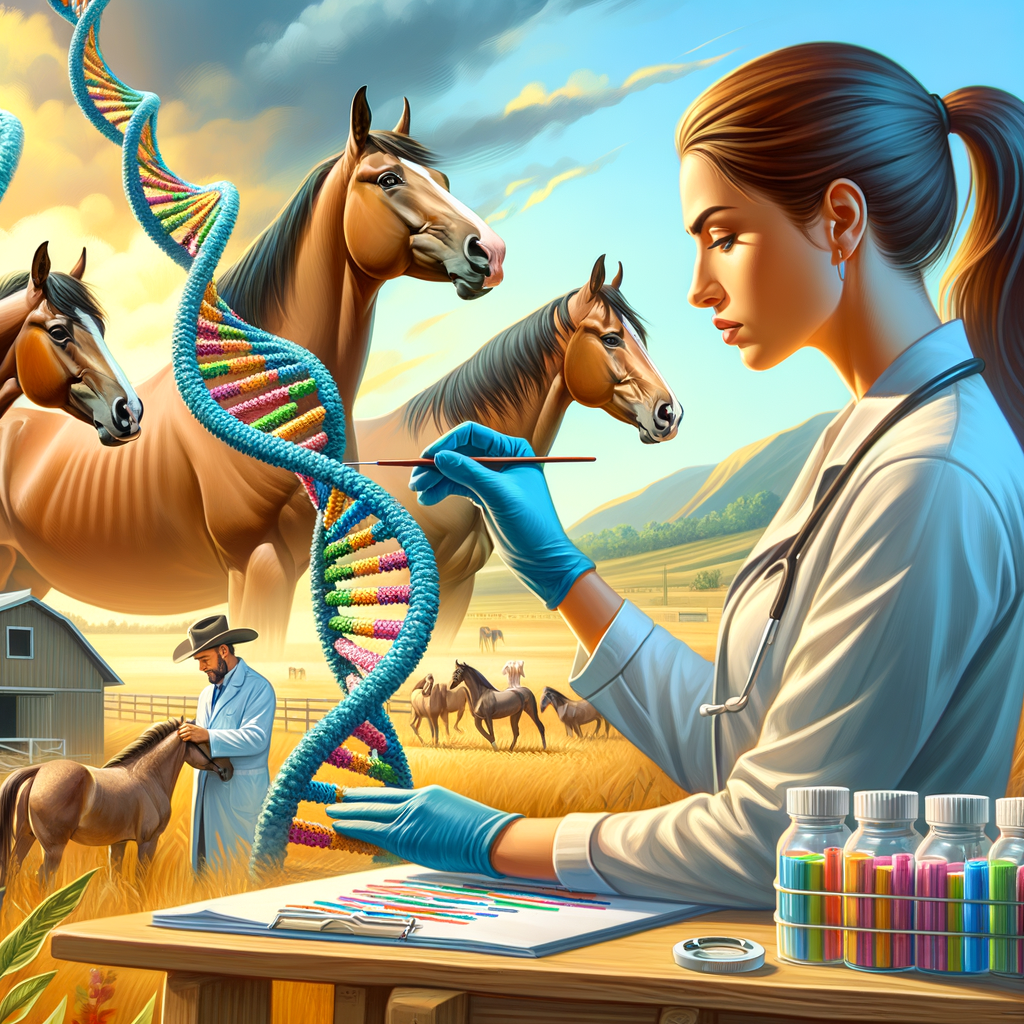
Introduction to Quarter Horse Genetics
Welcome to the fascinating world of Quarter Horse genetics. This introduction will provide you with a basic understanding of the importance of genetics in horse breeding, with a specific focus on the Quarter Horse breed.
- Understanding the importance of genetics in horse breeding
- Overview of Quarter Horse breed
Genetics play a crucial role in horse breeding. It’s like a blueprint that determines a horse’s physical characteristics, performance abilities, and even its health. By understanding genetics, breeders can make informed decisions to produce healthy and high-performing horses.
The Quarter Horse is one of the most popular and versatile breeds in the world. Known for their speed, agility, and muscular build, these horses are a favorite among breeders and equestrians alike. The Quarter Horse’s unique genetic makeup contributes to its distinct characteristics and abilities.
Let’s take a closer look at the Quarter Horse’s genetics. The breed’s genetic profile is a result of careful breeding practices over centuries. This has led to the development of specific traits that are now associated with the breed, such as its compact body, powerful hindquarters, and exceptional speed over short distances.
Understanding the Quarter Horse’s genetics is not just about appreciating their physical attributes. It’s also about understanding their health. Certain genetic conditions are more prevalent in Quarter Horses, and understanding these can help breeders and owners provide the best care for these magnificent animals.
In the following sections, we will delve deeper into the role of genetics in horse breeding, provide a practical guide for Quarter Horse breeders, and conclude with the power of understanding Quarter Horse genetics. So saddle up and join us on this exciting journey!
Understanding Quarter Horse Genetics
When it comes to Quarter Horses, their genetics play a significant role in determining their traits. Let’s delve deeper into understanding these genetic traits and how they are passed down through generations.
Genetic Traits in Quarter Horses
Genetic traits are characteristics that are passed from parents to their offspring through genes. In Quarter Horses, these traits can range from their coat color to their speed and agility. Let’s explore some of the common genetic traits in Quarter Horses and how they are inherited.
- Common genetic traits in Quarter Horses
- Coat Color: The most common coat colors in Quarter Horses are bay, chestnut, and sorrel. These colors are determined by the genes they inherit from their parents.
- Speed and Agility: Quarter Horses are renowned for their speed, especially over short distances. This trait is also genetically inherited.
- Muscular Build: The muscular build of Quarter Horses is another trait that is passed down through genes.
- How these traits are passed down through generations
Quarter Horses are known for their muscular build, compact body, and exceptional speed. These traits are largely due to their unique genetic makeup. Some of the common genetic traits in Quarter Horses include:
Genetic traits in Quarter Horses are passed down from parents to offspring through genes. Each horse inherits two sets of genes, one from each parent. These genes carry the information that determines the horse’s traits.
For instance, if both parents have the gene for a muscular build, there is a high chance that their offspring will also have a muscular build. Similarly, if one parent has the gene for speed and the other for agility, the offspring could inherit either or both of these traits.
It’s important to note that the inheritance of traits is not always straightforward. Some traits are dominant, meaning they are more likely to be passed on, while others are recessive, meaning they are less likely to be passed on. Understanding these genetic principles can help breeders make informed decisions when breeding Quarter Horses.
Genetic Disorders in Quarter Horses
As we delve deeper into the world of Quarter Horse genetics, it’s important to understand that, like all creatures, these horses are not immune to genetic disorders. These disorders can affect their health, performance, and overall quality of life. Let’s explore some of the most common genetic disorders in Quarter Horses and understand their genetic basis.
- Common Genetic Disorders in Quarter Horses
- Hyperkalemic Periodic Paralysis (HYPP): This disorder affects the horse’s muscle function, leading to episodes of muscle twitching, weakness, and even collapse.
- Polysaccharide Storage Myopathy (PSSM): PSSM causes muscle stiffness, pain, and weakness in horses. It is often associated with a diet high in carbohydrates.
- Hereditary Equine Regional Dermal Asthenia (HERDA): HERDA is a skin condition that causes the horse’s skin to become fragile and easily torn.
- Understanding the Genetic Basis of These Disorders
There are several genetic disorders that are more prevalent in Quarter Horses. Some of these include:
These are just a few examples. It’s important for breeders and owners to be aware of these disorders to provide the best care for their horses.
Each of these disorders is caused by a specific mutation in the horse’s DNA. For example, HYPP is caused by a mutation in the gene that controls sodium channels in muscle cells. PSSM is linked to a mutation that affects how the horse’s body stores and uses glycogen, a form of sugar used for energy. HERDA is caused by a mutation that affects the production of collagen, a protein that gives strength and elasticity to the skin.
These disorders are inherited, meaning they can be passed down from parent to offspring. Some are dominant, meaning only one copy of the mutated gene is needed for the horse to have the disorder. Others are recessive, meaning the horse must inherit two copies of the mutated gene, one from each parent, to have the disorder.
Understanding the genetic basis of these disorders can help breeders make informed decisions and potentially reduce the prevalence of these disorders in the Quarter Horse population.
By understanding the genetic disorders that can affect Quarter Horses, we can better care for these magnificent animals and continue to improve the health and vitality of the breed.
Role of Genetics in Horse Breeding
Understanding the role of genetics in horse breeding is crucial for any successful breeding program. It helps breeders make informed decisions and can significantly impact the health, performance, and overall quality of the horses produced.
Genetic Factors in Horse Breeding
There are several genetic factors that influence horse breeding decisions. Let’s delve into these factors and explore a case study of a successful breeding program that was based on a deep understanding of genetics.
- How genetic factors influence horse breeding decisions
- Case study: Successful breeding program based on understanding of genetics
Genetic factors play a pivotal role in horse breeding. They determine the horse’s color, size, performance ability, and even their susceptibility to certain diseases. For instance, a breeder looking to produce a fast, agile racehorse would consider the parent horses’ speed and agility genes. Similarly, a breeder aiming to breed a large, strong workhorse would focus on the genes related to size and strength.
Let’s consider the case of a successful Quarter Horse breeding program. The breeders, with a deep understanding of genetics, were able to produce horses with superior speed and agility. They carefully selected parent horses with strong speed and agility genes and used genetic testing to ensure these traits were passed on to the offspring. This resulted in a line of Quarter Horses that consistently outperformed their peers in races and agility competitions.
In conclusion, a deep understanding of genetics can greatly enhance a horse breeding program. It allows breeders to make informed decisions and produce horses that meet their specific needs and expectations.
Genetic Testing in Horse Breeding
Genetic testing plays a crucial role in horse breeding, particularly when it comes to breeding Quarter Horses. It not only helps breeders make informed decisions but also aids in preventing genetic disorders.
- The Importance of Genetic Testing in Breeding Quarter Horses
Genetic testing is a powerful tool in the world of horse breeding. For Quarter Horses, it is especially important. This breed is known for its speed and agility, traits that are largely determined by genetics. By using genetic testing, breeders can identify the horses with the best genes for these traits, ensuring the highest quality offspring.
For example, a study conducted by the American Quarter Horse Association (AQHA) found that horses with a specific gene variant were significantly faster than those without it. This information is invaluable to breeders, allowing them to select the best horses for breeding.
- How Genetic Testing Can Help Prevent Genetic Disorders
Genetic testing is not only useful for identifying desirable traits, but it is also crucial for preventing genetic disorders. Many horse breeds, including Quarter Horses, are prone to certain genetic disorders. These disorders can cause a variety of health problems, ranging from mild to severe.
By using genetic testing, breeders can identify horses that carry these disorders. This allows them to make informed decisions about which horses to breed, helping to prevent these disorders from being passed on to future generations. For instance, a common genetic disorder in Quarter Horses is Hereditary Equine Regional Dermal Asthenia (HERDA). Through genetic testing, breeders can identify carriers of this disorder and avoid breeding them, thus reducing the prevalence of HERDA in the breed.
| Genetic Disorder | Effect on Horse | Prevention through Genetic Testing |
|---|---|---|
| Hereditary Equine Regional Dermal Asthenia (HERDA) | Causes skin to be fragile and easily torn | Identify carriers and avoid breeding them |
| Polysaccharide Storage Myopathy (PSSM) | Leads to muscle stiffness and weakness | Identify carriers and avoid breeding them |
In conclusion, genetic testing is an invaluable tool in horse breeding. It allows breeders to select the best horses for breeding and helps prevent the spread of genetic disorders. By understanding and utilizing genetic testing, breeders can ensure the health and quality of their horses.
Practical Guide for Quarter Horse Breeders
As a Quarter Horse breeder, it’s crucial to understand and apply best practices in your breeding program. This guide will provide you with valuable insights and tips to ensure your success.
Breeding Quarter Horses: Best Practices
Here are some of the best practices you should consider when breeding Quarter Horses:
- How to use genetic information in breeding decisions
- Key takeaways for successful Quarter Horse breeding
- Understand the genetics: As mentioned above, understanding the genetics of your horses can help you make informed breeding decisions.
- Choose the right pair: The success of your breeding program largely depends on the pair you choose. Make sure they are healthy, have good temperaments, and possess the traits you want to pass on.
- Provide proper care: The health and well-being of your horses should be your top priority. Make sure they are well-fed, exercised, and receive regular veterinary check-ups.
Genetic information plays a pivotal role in breeding decisions. It helps breeders to predict the traits and characteristics of the offspring. For instance, if both parents have a genetic predisposition for speed, their offspring are likely to be fast runners too. Therefore, understanding and using genetic information can significantly improve the quality of your breeding program.
Successful Quarter Horse breeding requires a combination of knowledge, patience, and dedication. Here are some key takeaways:
In conclusion, successful Quarter Horse breeding is a meticulous process that requires a deep understanding of genetics and a commitment to the well-being of your horses. By following these best practices, you can significantly improve the success rate of your breeding program.
Future of Horse Genetics Study
The study of horse genetics has seen significant advancements in recent years. As we continue to delve deeper into the world of equine genetics, we are uncovering new knowledge that could greatly impact the future of horse breeding.
- Latest Research in Equine Genetics
- How This Research Could Impact Future Breeding Practices
Scientists are tirelessly working to uncover the secrets of equine genetics. The latest research has led to the discovery of specific genes that influence a horse’s physical traits and performance abilities. For instance, a study found a gene that is responsible for a horse’s gait, which is the way it moves. This discovery could allow breeders to selectively breed horses for specific gaits.
| Gene | Impact on Horse |
|---|---|
| Gait Gene | Controls the way a horse moves |
The implications of these genetic discoveries are vast for the future of horse breeding. Understanding the genetic makeup of horses allows breeders to make more informed decisions. They can selectively breed horses based on their genetic traits, leading to healthier and more desirable offspring.
For example, if a breeder wants to produce a horse with a specific gait, they could choose parents who carry the gene for that gait. This could revolutionize the breeding industry, making it more efficient and predictable.
In conclusion, the future of horse genetics study is promising. As we continue to uncover more about equine genetics, the possibilities for horse breeding are expanding. With this knowledge, breeders can produce healthier, stronger, and more desirable horses for generations to come.
Conclusion: The Power of Understanding Quarter Horse Genetics
As we draw this enlightening journey to a close, it’s essential to look back and appreciate the knowledge we’ve gained about Quarter Horse genetics. This understanding is not just for the sake of knowledge but plays a crucial role in horse breeding, especially for Quarter Horses.
- Recap of the importance of genetics in horse breeding
Genetics, as we’ve learned, is the blueprint of life. It determines the traits, characteristics, and potential abilities of a Quarter Horse. From color patterns to speed, endurance, and even temperament, genetics plays a significant role in shaping these aspects.
For breeders, understanding genetics is like having a map and compass in the world of horse breeding. It guides them in making informed decisions, ensuring the health, longevity, and quality of their horses. It also aids in preserving and enhancing the unique qualities that make Quarter Horses so loved and admired.
- Final thoughts on the future of Quarter Horse breeding
Looking into the future, the importance of understanding Quarter Horse genetics will only grow. As science and technology advance, we’ll be able to delve deeper into the genetic makeup of these magnificent creatures. This knowledge will enable breeders to make even more precise breeding decisions, leading to healthier, stronger, and more talented Quarter Horses.
Moreover, as we continue to unravel the mysteries of genetics, we may discover new ways to combat genetic diseases and improve the overall well-being of Quarter Horses. The future of Quarter Horse breeding is indeed bright, filled with promise and exciting possibilities.
In conclusion, understanding Quarter Horse genetics is a powerful tool. It’s a blend of science and art that, when mastered, can lead to the creation of truly exceptional Quarter Horses. So, let’s continue to learn, explore, and appreciate the fascinating world of Quarter Horse genetics.






